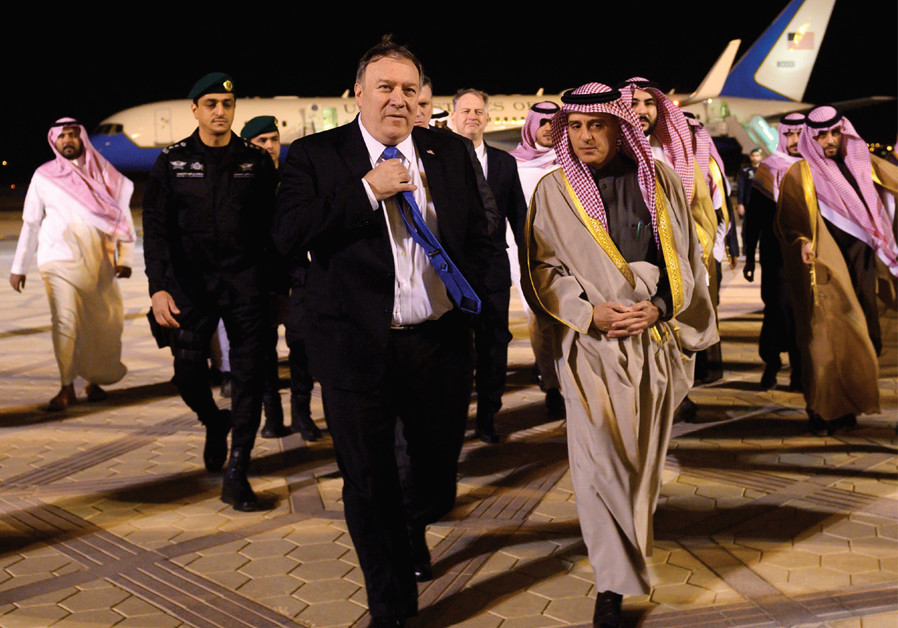Pompeo: No peace in the Middle East without confronting Iran

US SECRETARY of State Mike Pompeo is welcomed by Saudi Minister of State for Foreign Affairs Adel al-Jubeir and other dignitaries in Riyadh earlier this month.. (photo credit: REUTERS)
Confronting Iran is the only way to ensure peace in the Middle East, US Secretary of State Mike Pompeo said prior to meeting with Prime Minister Benjamin Netanyahu on the sidelines of the Warsaw ministerial conference on Thursday.
“You can’t achieve peace and stability in the Middle East without confronting Iran, it is just not possible. They are a maligned influence in Lebanon, in Yemen and Syria and Iraq. The three H’s, Houthis, Hamas and Hezbollah, these are real threats. There are others as well,” Pompeo said.
US @SecPompeo to Israel’s @netanyahu in #Warsawsummit: You can’t achieve peace & stabilityin the Middle East without confronting #Iran pic.twitter.com/jtj9EHTePa
— Noa Landau נעה לנדאו (@noa_landau) February 14, 2019
“You can’t get peace in the Middle East,” he said. Top diplomats at the US-backed conference, which opened on Wednesday night, are expected to discuss regional challenges, including the Israeli-Palestinian conflict. The main thrust of the gathering, however, is to create an united US, European and Arab front against Iran.
“We will continue to build on what happened last night between all the parties who are deeply interested [in pushing] back against all the threats, including Iran, in the Middle East,” Pompeo said.
Netanyahu said he had stood the night before among 60 representatives of other countries, including leading Arab countries.
They stood together and “spoke with unusual force and clarity and unity against the common threat of the Iranian regime. This marks a change, and an important understanding of what threatens our future and what we need to do to secure it and the possibility of cooperation that extend beyond security in every realm of life or peoples in the Middle East.”
He added that it was a “historical turning point.”
“This happened here. It happened in Warsaw and it must continue in other forms and other ways,” Netanyahu said.
After a brief meeting, he and Pompeo joined the large group of representatives from 60 nations that sat around four large tables that formed a square. A Saudi delegation was among them.
Pompeo, who helped open the meeting, noted the presence of the Israelis and Arab nations.
“They all came together for a single reason—to discuss the real threats emanating from the Middle East,” he said.
Pompeo noted that representatives from the European Union and NATO were included in the gathering.
“The US seeks a new era of cooperation between all of our countries on how to confront these issues,” he said.
The composition of the gathering, he said, represented US President Donald Trump’s commitment to bring nations together to solve new problems.
The US, he said, wants to engage in dangle that would break out of “traditional thinking.”
“Please leave your note cards and speeches in your brief case and purse,” said Pompeo. “Let’s have a candid conversation.
“I will detail the Trump’s Administration’s next steps on Syria and after that [US envoy] Jared Kushner will discuss the administration’s effort to advance peace,” Pomeo said.
“They will also discuss Iran, terrorism, cybersecurity,” he said, adding that “no county can afford to remain on the sidelines.
“The US will continue to lead on Middle East security issues. We will continue to be a force for good in the region. We cannot be bound by the past,” said Pompeo, as he urged the countries to work toward a bright future.
Join Jerusalem Post Premium Plus now for just $5 and upgrade your experience with an ads-free website and exclusive content. Click here>>






Comments are closed.